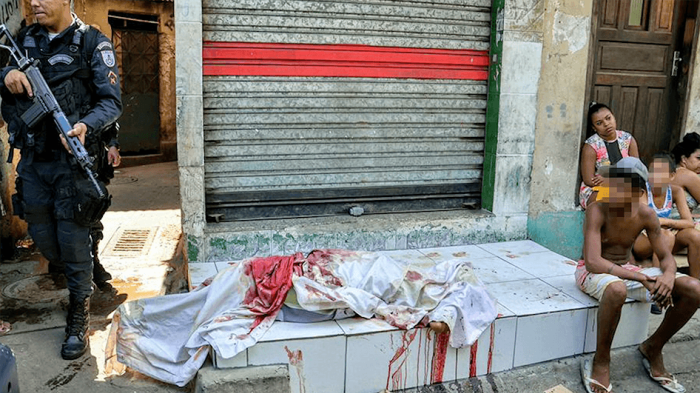(Rio de Janeiro) – Rio de Janeiro state promised improvements in public security in preparation for the Olympics, but it has not done enough to address extrajudicial executions by police, a central obstacle to more effective law enforcement, Human Rights Watch said in a report released today.
The 109-page report, “‘Good Cops Are Afraid’: The Toll of Unchecked Police Violence in Rio de Janeiro,” documents how unlawful police killings have contributed to the unraveling of the state’s ambitious efforts to improve public security.
Rio police have killed more than 8,000 people in the past decade, including at least 645 in 2015. Many police killings were most likely the result of the legitimate use of force, but many others were extrajudicial executions, Human Rights Watch found.
“Violent crime is a very real problem in Rio, but executing suspected criminals is not the answer,” said Maria Laura Canineu, Brazil director at Human Rights Watch. “These unlawful killings turn communities against the police and undermine security for all.”
Human Rights Watch interviewed more than 30 Rio police officers, including several who described their experiences with the use of lethal force, and two who admitted direct involvement in executions. One officer recounted an operation in which a fellow officer executed a suspected member of a drug gang as he lay injured on the ground. Another described an operation designed to kill suspected gang members, not arrest them.
Officers said they would not report the crimes of their colleagues for fear that they too would be killed. “They would not think even a millisecond before killing me or my family,” one of them said.
Police officers involved in unlawful killings routinely seek to cover up their criminal behavior, Human Rights Watch found. Police threaten witnesses, plant guns or drugs on their victims, and remove corpses from crime scenes and deliver them to hospitals, claiming they were trying to “rescue” them.
Human Rights Watch found credible evidence in 64 cases that police had sought to cover up unlawful killings. These cases reflect a much broader problem, according to local justice officials. They told Human Rights Watch that a large number of the “shootouts” reported by police in the state in recent years were in fact extrajudicial executions. Official government data supports this conclusion.
During the alleged “shootouts” reported from 2013 through 2015, Rio police killed five times as many people as they injured, the reverse of what one would expect. In 2015, they killed 24.8 people for each officer who died on duty, more than double the ratio of South Africa and triple that of the United States.
Unlawful killings by police take a heavy toll – not only on the victims and their families, but also on the police force itself, Human Rights Watch found. The killings fuel cycles of violence that endanger the lives of all officers serving in high-crime areas, poison their relationships with local communities, and contribute to high levels of stress that undermine their ability to do their jobs well.
The 64 cases in which Human Rights Watch found evidence of a cover-up include 35 cases originally documented in the 2009 report “Lethal Force,” and 29 cases documented since, 12 of them in the past two years. In the 64 cases, 116 people lost their lives, including at least 24 children.
Almost all the cases were reported as “shootouts” by police. Yet, in at least 20, autopsy reports showed victims had been shot at point-blank range. In other cases, crime-scene analyses or witness testimony indicated there had been no shootout.
The officers responsible for unlawful killings and cover-ups are rarely brought to justice. Civil police investigations have been woefully inadequate, Human Rights Watch found. The responsibility ultimately lies with Rio de Janeiro’s Attorney General’s Office, which has legal authority to oversee the work of the police investigators, as well as to carry out its own investigations, Human Rights Watch said.
“By failing to investigate killings by police, the authorities are not only denying justice to victims’ families, they are also doing a great disservice to the Rio police force itself,” Canineu said. “As long as there’s no accountability, there will continue to be officers who who commit extrajudicial executions, making the job of policing Rio more difficult and dangerous for all the rest.”
In its bid for the Olympics, the Brazilian government said that the games would act “as a big catalyst of long-term improvements in the security apparatus” of the city of Rio de Janeiro. Rio’s main security initiative was a project to move away from militarized raids into poor neighborhoods to establishing police stations focused on community policing, called Pacifying Police Units (UPPs).
While the number of officially recorded killings by police decreased after a peak of more than 1,300 in 2007 to around 400 in 2013, the number has since risen, reaching 645 in 2015 and 322 from January to May 2016, according to the latest data available.
Rio authorities have recently taken several steps to improve how cases involving police killings are handled, including by creating a special prosecutorial unit focusing on police abuse. But additional steps are needed to strengthen the new unit and ensure the proper investigation and prosecution of these cases, Human Rights Watch found.
“You can’t expect community policing to work when police are executing members of the communities they are supposed to protect,” Canineu said. “And you can’t expect honest cops to perform well when they live in constant fear – not only of gang members, but also of their fellow officers.”









